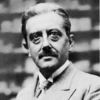Georges Bernanos

Georges Bernanos
Georges Bernanoswas a French author, and a soldier in World War I. Of Roman Catholic and monarchist leanings, he was critical of bourgeois thought and was opposed to what he identified as defeatism. He thought this led to France's eventual occupation by Germany in 1940 during World War II. Most of his novels have been translated into English and frequently published in both Great Britain and the United States...
NationalityFrench
ProfessionAuthor
Date of Birth20 February 1888
CountryFrance
What does it matter, all is grace.
Purity is not imposed upon us as though it were a kind of punishment, it is one of those mysterious but obvious conditions of that supernatural knowledge of ourselves in the Divine, which we speak of as faith. Impurity does not destroy this knowledge, it slays our need for it.
A thought which does not result in an action is nothing much, and an action which does not proceed from a thought is nothing at all.
[A] good Christian does not care for miracles very much, because a miracle is God looking after His own affairs, and we prefer looking after them for Him.
The modern state no longer has anything but rights; it does not recognize duties any more.
The worst, the most corrupting of lies, are problems poorly stated,
Faith is not a thing which one ''loses',' we merely cease to shape our lives by it.
Truth is meant to save you first, and the comfort comes afterward.
The wish to pray is a prayer in itself. God can ask no more than that of us.
To you a pious young girl who goes to mass and communion, seems pretty silly and childish; you take us for innocents... Well, let me tell you, sometimes we know more about evil than people who have only learned to offend God.
I have just discovered something I have always known: we can no more escape from one another than we can escape from God.
Like all truly pure souls she [Chantal] quickly resigned herself to past faults, thought only of how to repair whatever harm they had done. "Of all my daughters, you are certainly the least bothered by scruples of conscience," Abbé Chevance used to say.... Even sin, once the will is detached and no longer nourishes it, withers and dies sterile. It is in the secret of intentions, like in a decomposing humus, in the dark forest of future sins, unpardoned sins, half dead, half living, that new poisons are distilled.
Sadness came into the world with Satan that world our Saviour never prayed for, the world you say I do not know. Oh, it is not so difficult to recognize: it is the world that prefers cold to warmth! What can God find to say to those who, of their own free will, of their own weight incline towards sadness and turn instinctively towards the night?
If hell has no answer for the questioning dead, it is not because it refuses to answer (for rigorous, alas, in observance, is the imperishable fire), but it is because hell has nothing to say, will say nothing eternally.